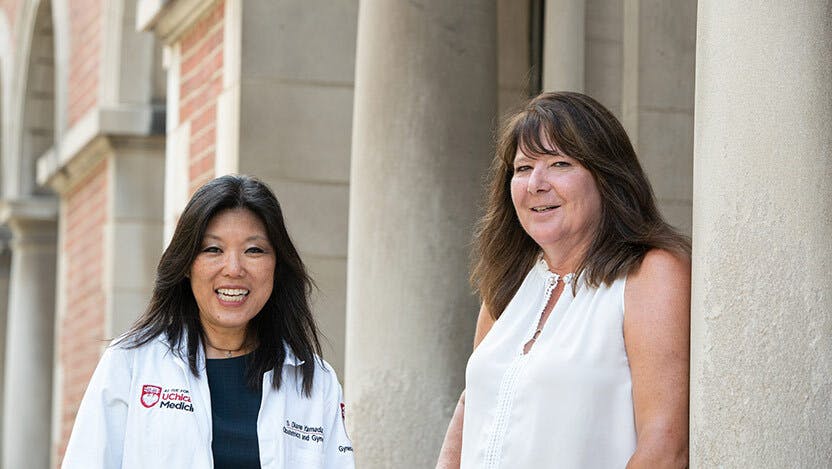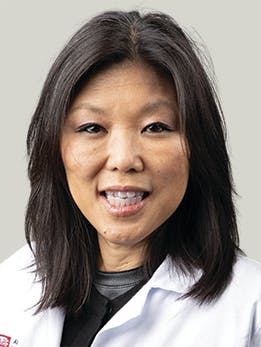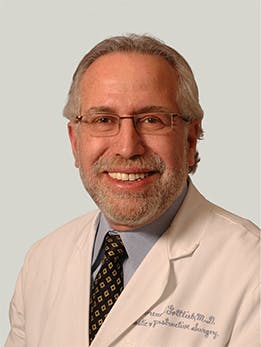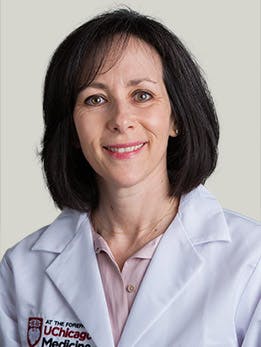Many women have never heard of vulvar cancer. Here's what a survivor would like you to know

There are many distinctive ribbons people wear to raise awareness about cancer: Pink ribbons, the most well-known, are for breast cancer; blue ribbons are for colon cancer, while orange is for leukemia.
There is no specific ribbon, however, for vulvar cancer — a sign, perhaps, of the very private nature of a disease expected to be diagnosed in more than 6,000 women this year.
“Vulvar cancer occurs in a sensitive area and is rare, so you don’t have as big a community of cancer survivors,” said Diane Yamada, MD, Joseph Bolivar DeLee Professor of Obstetrics and Gynecology and Section Chief for Gynecologic Oncology at the University of Chicago Medicine. “Unfortunately, patients have a difficult time talking about this cancer, which is why it’s important to raise awareness about it and bring the discussion into the open.”
Susan Golden knows firsthand what Yamada is referring to. In the fall of 2015, she noticed a small, irritated lump on the left outer fold of her labia. Over the course of several months, it became painful and started to bleed.
A concerned gynecologist took a tissue sample from the lump and sent Golden for a second biopsy at Yamada’s clinic. There, Golden learned the tumor was vulvar cancer.
“Of course I was crying, my husband was crying,” recalled Golden, 53.
Vulvar cancer occurs in the outer skin of the genital organs. The vulva has two folds of skin called the labia. Older women can develop vulvar cancer as a result of a skin condition called lichen sclerosus, while younger women who have been exposed to HIV (the virus that can lead to AIDS), human papillomavirus (HPV) or cigarette smoke are at increased risk for developing it.
“Some patients may not necessarily recognize or believe there’s something going on in the vulvar area,” Yamada explained. “Many people don’t look until there is some abnormal bleeding, discharge or pain that brings them to a hospital.”
Like most patients, Golden had no idea how she developed the disease. Nor were there many people she felt she could talk to about it outside of the hospital. Fortunately, her husband John was incredibly supportive; during her cancer treatment, he attended all of her doctor’s appointments, and continues to do so today.
“I can honestly say I have never known about a support group for vulvar cancer or have ever even met another woman with vulvar cancer,” Golden said. “It’s not shouted out loud — but it does exist, it’s painful, and it can truly alter your life.”
Once Golden’s tumor was determined to be cancerous, Yamada began to assemble a team to tackle the large malignancy. For the 17-hour operation, she tapped the help of experts, including plastic and reconstructive surgeon Lawrence J. Gottlieb, MD, who has been performing vulvar reconstructive surgeries for more than 30 years.
“The operation was somewhat more complicated because we were dealing with adjacent tissues that made it more of a challenge,” said Gottlieb. “The No. 1 goal was to cure Susan of cancer.”
In order to ensure no cancerous cells were missed, Yamada removed a substantial amount of tissue, including the clitoris and part of the urethra, as well as 24 lymph nodes. Gottlieb then used tissue from Golden’s buttock area for reconstructive surgery.
“If you don’t have the expertise or the ability to plan for what will allow the best outcome, you may resort to other approaches like radiation or a less-than-optimal surgery,” Yamada explained.
In this case, successful surgery saved Golden from having to undergo radiation treatment. Five years have now passed, and Golden remains cancer free.
“I am alive and well and happy,” said Golden.
Mentally, she is still healing, and still sometimes feels phantom stitches when she sits too long. Along with the support of her husband and expertise of her surgical team, a key to Golden’s recovery has been the help she’s received from the Program in Integrative Sexual Medicine (PRISM) at UChicago Medicine. PRISM assists cancer patients in preserving and recovering sexual function lost as a consequence of their illness or treatment.
Most types of cancer and many of their treatments directly affect the sexual organs, meaning people with cancer usually suffer some change in their sexual function. Although Golden’s recovery included months of physical rehabilitation at the PRISM clinic, the therapy maintained her ability to have sexual intercourse.
“Because the vulva is a key organ for sexual function, patients with vulvar cancer often have significant concern about what’s going to happen to their clitoris, and will it work?” said gynecologist Stacy Tessler Lindau, MD, MA, PRISM’s director. “This can be hard to talk about if the surgeon doesn’t bring it up, but in this case, Susan was proactive in asking these questions.”
Golden hopes her openness in sharing her story will convince others to ensure they have a skilled gynecologist they trust and that they get regular checkups, especially when something doesn’t seem right.
“If I can help one other person to learn what vulvar cancer is, to recognize it, to take care of themselves and make sure they go to the right specialist – then I’ll feel like I’ve given something back to women who may be suffering from this cancer,” said Golden. “Every woman I talk to has no clue what this is.”

S. Diane Yamada, MD
Dr. Diane Yamada specializes in the diagnosis and treatment of gynecologic cancers. She is the principal investigator at the University of Chicago for the Gynecologic Oncology Group (GOG), a cooperative clinical trials group supported by the National Cancer Institute.
Learn more about Dr. Yamada
Lawrence J. Gottlieb, MD
Lawrence J. Gottlieb, MD, is an internationally known reconstructive plastic surgeon. He has clinical and research interests in reconstructive microsurgery, and the care of patients with burn injuries, difficult wounds, or complex reconstructive needs. Dr. Gottlieb works on many multidisciplinary teams to provide comprehensive, state-of-art treatment for a wide variety of adult and pediatric patients.
Learn more about Dr. Gottlieb
Stacy Tessler Lindau, MD, MA
Stacy Tessler Lindau, MD, MA, focuses on patient care, research, education and advocacy related to the health of aging women and urban populations. Dr. Lindau is the director of the Program in Integrative Sexual Medicine (PRISM), a program that provides care for and studies female sexual function in the context of aging and common illnesses.
Learn more about Dr. Lindau